Apache Trail

Brief Synopsis
Cast & Crew
Richard Thorpe
Lloyd Nolan
Donna Reed
William Lundigan
Ann Ayars
Connie Gilchrist
Film Details
Technical Specs

Synopsis
At a border town, stagecoach guard Tom Folliard is released from jail after serving time for consorting with criminals. When his brother, "Trigger" Bill, offers him a cut from a robbery, Tom says he wants nothing more to do with him, then tries to get his old job back. His boss decides instead to offer him a manager's post at the worst station on the line, Tonto Valley, in Apache territory. Tom is happy for the chance, and takes the next stage out. At the station, he is greeted by cook Señora Martinez and her daughter Rosalia, who is secretly in love with Tom. They are happy to have Tom as their new boss and, along with teenaged Indian Cochee, resolve to make Tonto Valley the best station on the line. Some weeks later, on the day that a coach carrying artist James V. Thorne and his wife and attractive, opportunistic widow Constance Selden arrives, distant smoke signals and Apache war drums concern Tom. That afternoon, U.S. Cavalry Major Lowden arrives to pick up supplies, and a short time later, Bill rides in, causing the wary Tom to lock up the company strongbox and confiscate Bill's guns. The next morning, when an Apache arrow is shot into the station, Tom rides out to investigate and gives the strongbox key to the stagecoach drivers. While Tom is gone, Constance indicates to Señora Martinez and Rosalia that she plans to marry him, even though Bill tells her that he is more her kind than Tom's. Despite the danger of an impending Apache attack, the major leaves for his fort and promises to send help. Out in the hills, Tom sees an Apache war party pulling a white man after them. He is able to free the wounded man, whose name is "Pike" Skelton, when the Apaches dismount to investigate a shot he fired. As they ride back to the station, Pike tells Tom that the Apaches are on the warpath because of an underhanded white man. Back at the station, Thorne paints a portrait of Cochee, then, on Bill's suggestion, paints him as well. When Bill says that the picture would be better with his guns, Thorne innocently gives him his, and Bill forces the other men to hand over the strongbox and all the weapons. He starts to ride off, forcing Constance to go with him, but when Cochee opens the station gates, Tom and Pike are there. Bill goads Tom into a gunfight and is shocked that Tom is able to outdraw him. Tom merely wounds Bill's hands, and while Bill and Pike are being treated, Pike reveals details about the white man whom the Apaches are seeking, and Bill is revealed to be the man. Later that night, when Constance tells Tom that she wants to spend the rest of her life with him, he kisses her, breaking Rosalia's heart. The next morning, the Apaches attack the station and Cochee is killed saving Tom's life. Mr. Thorne is also killed, after which a lone Apache rides to the station to warn that they must surrender Bill or be killed. When the Apache throws down the major's hat, they realize that the cavalry will not be coming. Tom insists that they vote on Bill's fate, and Tom breaks a tie by voting to save him. As they prepare for the next attack, Rosalia confesses her love to Tom, then Bill chides his brother for saving him, while secretly admiring him. As the station is surrounded, Bill steals a horse and rides off, leading the Apaches away from Tonto Valley. The next day, Constance takes the stage out, but Señora Martinez and Rosalia stay when Tom asks for Rosalia's hand.

Cast
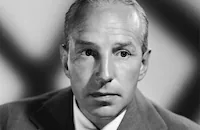
Lloyd Nolan
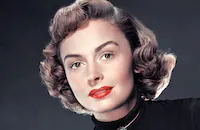
Donna Reed

William Lundigan
Ann Ayars

Connie Gilchrist
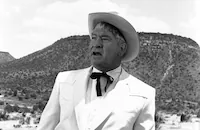
Chill Wills

Miles Mander

Gloria Holden

Ray Teal
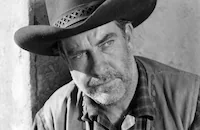
Grant Withers

Fuzzy Knight
Trevor Bardette
Tito Renaldo
Frank M. Thomas
George Watts
Emory Parnell
Edgar Dearing
Sarah Edwards
Nora Cecil
Mitchell Lewis
Joe Bernard
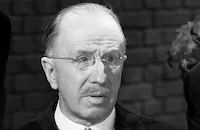
Arthur Hoyt
Walter Soderling

Byron Foulger
Al Hill
Crew
Maurice Geraghty
Cedric Gibbons
Stanley Goldsmith
Sydney Guilaroff
Horace Hough
Charles Hunt
Hugh Hunt
Gordon Kahn
Sol Kaplan
Samuel Marx
Stan Rogers
Douglas Shearer
Bert Spurlin
Frank Sullivan
Sidney Wagner
Edwin B. Willis

Film Details
Technical Specs

Articles
Apache Trail
Writer Ernest Haycox's story "Stage to Lordsburg" and his novel Trouble Shooters had been instrumental in the box-office revival of the big-budget Western in 1939, serving as the sources for Stagecoach and Union Pacific, respectively. So, when his story "Stage Station" appeared in Collier's Magazine in April of that year, it was snapped up by independent producer Samuel Goldwyn. After commissioning a treatment from Haycox, Goldwyn sold the package to MGM two years later. Originally, Apache Trail seemed slated as a vehicle for Hedy Lamarr, who was announced to star, along with John Carroll, later that month. By December, however, the focus had shifted to the good and bad brothers, roles announced for Robert Taylor and Wallace Beery. By the time the film went into production in March 1942, however, the leading roles had been earmarked for the studio's less-established players.
Richard Rosson was the first director assigned to the film, and he shepherded it through pre-production and the first month of shooting. During that time, Reed's character underwent a nationality change at the urging of the Production Code Administration. Concerned that presenting Rosalia and her mother (played by Connie Gilchrist) as servants would offend Latin American audiences (an important demographic at the start of World War II), the PCA suggested MGM make them Spanish and avoid presenting them "in such a matter that might make them appear grotesque, inferior or servile." That sensitivity did not, apparently, extend to the Native American characters. Although the Apaches at least have a reason for their attack on the station - Nolan's character has murdered some of their tribesmen - the film was promoted with a tagline that seems unbelievably racist by contemporary standards: "The Apaches are coming!...and a group of whites, joined by fate, battle for survival."
Apache Trail featured exterior footage shot near Tucson, Arizona, where MGM built a complete stage station. Then production moved to the studio for most of the shoot on a set supervised by art director Cedric Gibbons. In addition, the picture used stock footage originally shot for Stagecoach. After a month of shooting, Rosson fell ill and was replaced by Richard Thorpe, who was given sole directing credit despite the fact that he had only worked on the film for about two weeks.
The film received respectable reviews, with Variety commenting that Reed, Nolan and Lundigan "all acquit themselves well." Reed certainly did well enough to stay at the studio through her seven-year contract, though she would grow to resent her type-casting in good girl roles. Her romantic rival in the film, Ayars, wouldn't continue at MGM. After a few films, she left for New York to pursue a singing career, eventually becoming one of the leading sopranos at the New York City Opera. She would return to films in 1951 as one of the lead singers in Michael Powell's production of The Tales of Hoffmann. MGM returned to Haycox's story in 1952 for Apache War Smoke, though the remake only retained the idea of Apaches laying siege to a stage station because somebody there had murdered some tribe members. Instead of a sibling rivalry, the film featured Gilbert Roland as a reformed bandit and Robert Horton as his son, the station master. Reed's character was nowhere in sight.
Producer: Samuel Marx
Director: Richard Thorpe
Screenplay: Maurice Geraghty
Based on the short story "Stage Station" by Ernest Haycox
Cinematography: Sidney Wagner
Art Direction: Cedric Gibbons, Stan Rogers
Music: Sol Kaplan
Cast: Lloyd Nolan ("Trigger" Bill Folliard), Donna Reed (Rosalie Martinez), William Lundigan (Tom Folliard), Ann Ayars (Constance Selden), Connie Gilchrist (Senora Martinez), Chill Wills ("Pike" Skelton), Miles Mander (James V. Thorne), Gloria Holden (Mrs. James V. Thorne), Ray Teal (Ed Cotton), Grant Withers (Lestrade), Fuzzy Knight ("Juke"), Byron Foulger (Clerk). BW-66m.
by Frank Miller

Apache Trail
Quotes
Trivia
Notes
The working titles of this film were Stage Station and Desert Station. According to a contemporary, but unidentified news item in the AMPAS Library file on the film, Ernest Haycox's story was originally sold to Samuel Goldwyn studios. On August 1, 1941, Goldwyn sold the rights to the story, for which Haycox had written a brief treatment, to M-G-M. At that time, Donald Hough and Houston Branch worked on a sixty-five page treatment. A August 20, 1941 Hollywood Reporter news item noted that Cyril Hume was "scripting" the picture, which was to co-star John Carroll and Hedy Lamarr. Neither Hume, Hough nor Houston is credited onscreen, the SAB or in reviews, and the extent of their contribution to the final film has not been determined. An Hollywood Reporter news item on December 29, 1941 notes that Robert Taylor and Wallace Beery were to star in the film.
According to Hollywood Reporter news items and production charts, director Richard Rosson worked on the picture from the pre-production stage in late December 1941 through early April 1942, when thirty-one days of shooting had been completed. A Hollywood Reporter news item on April 6, 1942 noted that Rosson was ill and was being replaced by Richard Thorpe, who would finish the picture. Only Thorpe is given onscreen credit for direction of the film, which was completed by mid-April 1942. Other news items reveal the following information: exteriors for the film were shot on location in and around Tucson, AZ, where a "stage station" set was built especially for the production; following location shooting, production resumed at the studio on March 27, 1942; actors Eddie Dunn, and Aubrey Mather were cast in the film, but neither was in the released film; and, David Snell was at one time set to score the film.
According to information in the file on the film in the PCA/MPAA Collection at the AMPAS Library, the PCA advised M-G-M that the nationality of Rosalia and Señora Martinez should be changed to Spanish instead of Mexican, as they were in Ernest Haycox's short story. Correspondence in the file indicates that Addison Durland, the PCA's expert in Latin American matters, was concerned that certain aspects of the characterizations of the two women might be offensive to the Mexican people. A December 18, 1941 letter from Durland to M-G-M studio head Louis B. Mayer advised that, despite the change in Señora Martinez and Rosalia's nationality, the film should not "present them in such a manner that might make them appear grotesque, inferior or servile, in order to avoid the possibility of offending the great number of Latin American people of Spanish extraction." Additional information in the file indicates that the film contained stock shots originally shot for Walter Wanger's 1939 film Stagecoach (see AFI Catalog of Feature Films, 1931-40; F3.4284). M-G-M also adapted Haycox's story for the 1952 film entitled Apache War Smoke, directed by Howard Kress, and starring Gilbert Roland and Robert Horton. That film used some footage from the 1942 film.
















